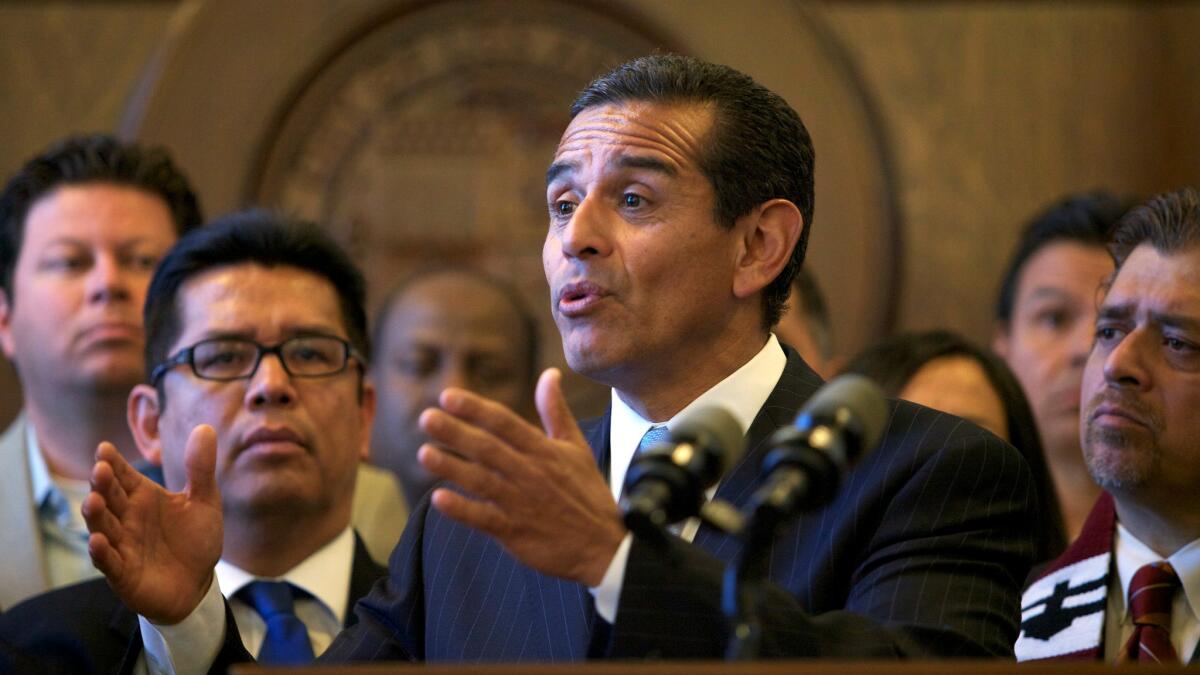Editorial: Outrage over Arizona’s immigration law was justified, but L.A.’s boycott proved to be a farce

A boycott can be a powerful form of political protest, inflicting economic damage in an effort to influence behavior.
There is a long list of boycotts throughout history that have helped right injustices: Economic and cultural sanctions on South Africa helped bring down that government’s repressive apartheid regime. The United Farm Workers’ grape boycott helped secure union contracts and better working conditions. And just this year, Georgia’s governor vetoed a bill that would have sanctioned discrimination against gays and lesbians after film studios, the National Football League and major corporations threatened to take their business to other states.
Not on the list of effective protests: The city of Los Angeles’ boycott of the state of Arizona for its adoption of discriminatory, anti-immigrant legislation in 2010.
Los Angeles was one of many cities that decided to halt travel and business with Arizona after then-Gov. Jan Brewer signed SB 1070, which essentially required police officers to engage in racial profiling by ordering them to check the status of people they suspected of being in the U.S. illegally. The law was wrongheaded, an attempt to bully immigrants into leaving the state and to turn local law enforcement into immigration agents.
The outrage over Arizona’s law was right and the cause was just, but Los Angeles’ boycott proved to be a joke.
Though city leaders were enthusiastic about the boycott, it quickly became clear that they were unwilling to sever ties with Arizona. City employees were ordered to scrutinize contracts with Arizona companies to see which could legally be canceled but few, if any, were ultimately terminated. The City Council passed exemption after exemption permitting new contracts to be signed with Arizona companies and allowing employees to travel to the state. This week, the council approved a $57.6-million contract for police officer body cameras with Scottsdale-based Taser International. So much for sending a message.
Several other California cities and counties enacted and also failed to follow through on their boycotts. But many suspended their sanctions after a federal court struck down some of the Arizona law’s provisions. The U.S. Supreme Court in 2012 upheld the most controversial element of the law, the so-called show-your-papers rule, under which police are required to check the immigration status of anyone they stop.
Clearly there is still cause for concern over Arizona’s treatment of immigrants. Yet Los Angeles City Councilman Gil Cedillo argues that the city’s boycott has become a farce and should be ended. He’s right – a boycott riddled with exceptions is empty symbolism and cheapens Los Angeles’ moral authority.
But this isn’t just an Arizona question. This year, the City Council has also proposed boycotts of North Carolina and Mississippi, after those states adopted laws that would allow discrimination against gay, lesbian, bisexual and transgender people.
Again, the cause is just. But council members need to ask themselves whether they are really willing to sever economic ties with an entire state, which is, by its nature, an amorphous target of activism? Do they think, based on history and past actions, that the boycott will have a meaningful impact – or whether they’ll have just as much effect by sending a scathing letter of denunciation? Are they prepared to follow through on the boycott if there are negatives consequences for Los Angeles or for their constituents? What if the sanctions mean losing out on the best bid for a contract or skipping an important event in the state?
If leaders don’t feel like they can take a hit to the city’s bottom line in order to send a message, then they ought to skip the official sanctions.
Follow the Opinion section on Twitter @latimesopinion and Facebook
More to Read
A cure for the common opinion
Get thought-provoking perspectives with our weekly newsletter.
You may occasionally receive promotional content from the Los Angeles Times.






